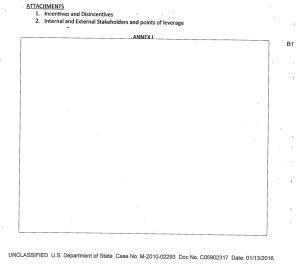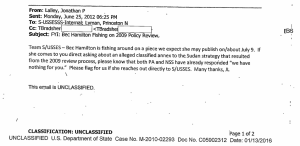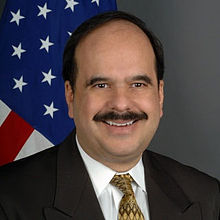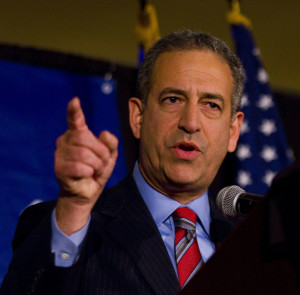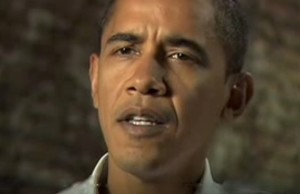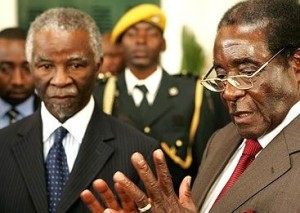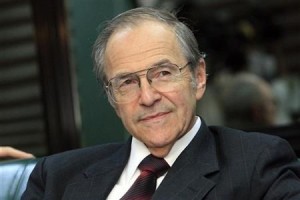State Department Dishonesty and Incompetence on Sudan: Sometimes Indistinguishable, Always Consequential
Eric Reeves | July 21, 2016 | http://wp.me/p45rOG-1UZ .
The legacy of incompetence and dishonesty on the part of President Obama’s first choice as Special Envoy for Sudan, Air Force Major-General (retired) Scott Gration, lives on. Moreover, that legacy has recently been extended to reveal U.S. State Department contempt for those seeking to inquire about the nature and motivations of the Obama administration’s review of U.S. policy toward Sudan during Gration’s first year. I offer here a summary of the nature and consequences of policies unarticulated publicly, but clearly implicit in the aftermath of the Sudan Policy Review of 2009, August 2009 – December 2011.
Air Force Major-General (retired) Scott Gration, President Obama’s first Special Envoy for Sudan
But first a remarkable report. On July 7, 2016, Unredacted: The National Security Archive, Unedited and Uncensored provided us with several notable facts about an “Annex” to this 2009 Sudan Policy Review, the final document prepared by the Obama administration State Department—with what must have been immense, if unreported, pressure from the U.S. military and intelligence communities.
[1] Even though then-Secretary of State Hillary Clinton declared in October 2009 that there was “a classified annex to our strategy” (the Sudan Policy Review), Special Envoy Gration declared in Congressional testimony of December 2009 that “there is no Annex.” The question of whether there was or was not an Annex has been settled definitively this month with the report from Unredacted, which has released the Annex. To be sure, the document’s contents were completely redacted; but the heading of the document includes the words:
ATTACHMENTS:
- Incentives and Disincentives
- Internal and External Stakeholders and points of leverage
Annex 1
Click on document to enlarge
The document was released to Unredacted and the “Genocide Documentation Center” only six years after a Freedom of Information Act (FOIA) request from Rebecca Hamilton, a Harvard-trained lawyer now on the faculty at American University, where she teaches teaching national security law and international law.
So, why the delay in releasing a document completely redacted except for its heading and the State Department case number?
The Sudan Policy Review document was produced at a critical time, with the transition from the Bush administration to an Obama administration that saw Sudan in rather different ways. And one thing was clear from the appointment of Gration: President Obama was content to appoint an untrained political supporter from the 2008 presidential campaign to perhaps the most difficult special envoy’s job in the world; Obama did so despite the fact that Gration had no diplomatic experience, had only the crudest knowledge of Sudan and the Khartoum regime, and spoke no relevant language (notably Arabic). It was widely known that Gration coveted the ambassadorship in Nairobi, which he received after an immensely destructive two-year stint as Sudan special envoy.
What to make of the fact that Gration lied to the Congress about the existence of an “Annex” to the Sudan Policy Review? And why such a stupid lie, given Secretary of State Clinton’s earlier admission that there was a classified “Annex”? Did Gration simply believe the existence of the document would never be released to contradict his claim? Was he ignorant of possibility that it would eventually be released, at least in name, through a FOIA request? Although there was never any doubt about Gration’s incompetence, his ignorance, or his lack of familiarity with diplomatic protocol—including the particular authority of statements by the U.S. Secretary of State—this lie made no sense.
And yet dutifully that State Department sprang into action, making sure that Professor Hamilton would not receive even a completely redacted text, if that text revealed what Clinton had already admitted: there was a classified Annex. Was this to protect Gration? Was it an effort to conceal the fact that a great deal of the U.S. Sudan policy review was far from publicly articulated? The headings to the Annex certainly suggests as much. Did State Department behavior reflect lingering hostility toward the American civil society movement to halt genocide in Darfur—an effort in which Professor Hamilton was a prominent participant?
The clearest evidence we have comes in the form of a June 25, 2012 “email alert,” the document with which the Unredacted article begins. The email came from Jonathan P. Lalley, special assistant to the State Department spokesman. It is blunt and unambiguous, with the header “Bec Hamilton fishing on 2009 policy review.” Among the recipients, in addition of the general Sudan policy audience (S-USSESSS-Internal) is Princeton Lyman, the man who succeeded Gration as special envoy for the Sudans (by this point, South Sudan was an independent country); a partially redacted name also appears: [TBradsher…..]. Lalley’s intention is clearly to put obstacles in the way of Hamilton’s research:
Team S/USSES – Bec Hamilton is fishing around on a piece we may expect she may publish on/about July 9 [2012—i.e., one year after Southern independence—ER]. If she comes to you direct asking about an alleged classified annex to the Sudan strategy that resulted from the 2009 review process, please know that both PA and NSS [National Security Strategy Archive[?]—ER] have already responded [to Hamilton:] “we have nothing for you.” Please flag for us if she reaches out directly to S/USSES. Many thanks, JL
Click on document to enlarge
[released January 13, 2016—three and a half years after its composition and distribution, and six years after Hamilton’s original FOIA request for the “Annex.”
Of course there is deliberate ambiguity in the response, for “we have nothing for you” can mean:
[1] There is nothing in our archives that matches your request;
[2] There is nothing in our archives that matches your request except a classified document.
The point of course was to suggest the first when in fact the second was true. But by citing this ambiguous response as a guideline for others who might be contacted by the “fishing” Hamilton, all receiving Lalley’s email would understand that they were to replicate this ambiguous statement: “There is nothing in our archives that matches your request,”—this despite the fact that most if not all of those receiving the email knew that a classified “Annex” did in fact exist.
Obama Administration dishonesty on Sudan
I wrote this earlier this month a piece that assessed the remarkable patterns of dishonesty within the Obama administration when it comes to Sudan:
“Why Can’t the Obama Administration Speak Honestly About Sudan?”
Special Assistant Lalley makes his own pusillanimous contribution to this pattern of dishonesty, but there were clearly reasons that the State Department was so eager to keep even knowledge of the Annex from Professor Hamilton. Perhaps one was to protect Gration from his lie to the Congress in December 2009—his declaration that there “was no Annex.” But Gration’s stupidity and incompetence were certainly well recognized by June 2012, and he was U.S. Ambassador in Nairobi by this time (a position from which he would be removed for reasons of incompetence by the State Department in less than a year). There would have been exceedingly little incentive to protect him from his deception of Congress, particularly since his lie stood in direct contradiction with Secretary of State Clinton’s earlier admission that there was an Annex.
The upshot?
In the absence of anything but a key document whose contents have been full redacted, we must infer the contents of the Annex from the statements and actions of the Obama administration subsequent to the Sudan Policy Review, during the tenures of both Gration and Lyman—and continuing to the present. We know that in August and September 2009 there were heated debates within the Obama administration about Sudan policy, pitting in particular Gration against Susan Rice, former Assistant Secretary of State for African Affairs and then U.S. Ambassador to the UN. Others in the administration also took sides. Rice knew Sudan and Khartoum exceedingly well, and was, by all accounts reaching me, aghast at the naiveté and foolishness of Gration’s vision of a new Obama administration Sudan policy. She was joined in her opposition to Gration’s policy vision by Samantha Power, who knew a good deal about Darfur and the character of the Khartoum regime (she has of course replaced Rice at the UN, even as Rice herself is now National Security Advisor to Obama).
Much of what made up the substance of the debate surely concerned Khartoum’s role in providing counter-terrorism intelligence as a means of generating a reciprocal lifting of U.S. economic and financial sanctions, as well as removal from the U.S. State Department list of “State Sponsors of Terrorism” (a list on which the Khartoum regime remains, joined only by Iran and Syria). It is almost certainly the discussion of terrorism and counter-terrorism intelligence that dictated the “classified” designation for the Annex.
Khartoum, Terrorism, Counter-terrorism Intelligence: the Obama Administration view
Gration notoriously claimed in Senate testimony (July 2009) that there was no evidence that Sudan should be kept on the list of State Sponsors of Terrorism—and further, that the decision to do so was purely “political.” This was a claim thoroughly belied by the contents of the State Department’s own published reports, as well as a vast amount of information available from other sources. In Senate testimony of July 30, 2009, Gration declared:
“There’s no evidence in our intelligence community that supports [Sudan] being on the state sponsors of terrorism. It’s a political decision,” Gration said. He also said the [the U.S. economic] sanctions are getting in the way of development work, particularly in southern Sudan, which is still recovering from a long civil war.” [(http://www.npr.org/templates/story/story.php?storyId=111422940/; Gration was an early and enthusiastic supporter of Khartoum’s plan to compel international relief organizations to convert their missions to focus on development—this as a prelude to a forced emptying of the camps for displaced persons. For a detailed overview of what was called at the time Khartoum’s “New Strategy for Darfur,” see here—ER; my commentary is always in blue italics, followed by my initials]
And yet the 2010 U.S. State Department characterization of Khartoum on the issue of state support for terrorism includes the following excerpts (from the year 2009, when Gration testified to the Senate). Although the report begins with expedient words of praise, much is disturbing—and remains so to this day. (See also my extended survey of evidence and reports that were ignored by the State Department: “The Obama Administration, Terrorism, and Hypocrisy,” Sudan Tribune, 6 May 2014 | http://wp.me/p45rOG-1i8/.)
[E]lements of designated Foreign Terrorist Organizations, including al-Qa’ida-inspired terrorists, remained in Sudan, as gaps remained in the Sudanese government’s knowledge of and ability to identify and capture these individuals as well as prevent them from exploiting the territory for smuggling activities. [These putative “gaps” in intelligence are highly dubious—see minutes of August 31, 2014 meeting of senior security and military officials in Khartoum—Appendix A—ER] Some evidence suggested that individuals who actively participated in the Iraqi insurgency have returned to Sudan, and may be in a position to use their expertise to conduct attacks within Sudan or to pass on their knowledge. Sudanese officials continued to view Hamas members as representatives of the Palestinian Authority. Hamas members conducted fundraising in Sudan, and Palestine Islamic Jihad (PIJ) maintained a presence in Sudan. [All emphases in bold in all quotes have been added—ER]
The Lord’s Resistance Army (LRA) continued to operate in the region, though there was no reliable information that corroborated allegations that the Government of Sudan provided support to the LRA. Operating in small cells, the LRA carried out attacks in areas where the borders of the Democratic Republic of the Congo, Central African Republic, and Southern Sudan intersect. The UN estimated that in 2010, LRA attacks displaced 25,000 southern Sudanese. In October, the African Union (AU) announced that Uganda, Sudan, the Democratic Republic of the Congo and the Central African Republic will form an AU-backed joint brigade to pursue the LRA. [Over the years there has in fact been a tremendous amount of information about Khartoum’s support for the LRA as a proxy force threatening Ugandan President Museveni; current reports place some of the remnants of the LRA in the Kafia Kingi enclave—part of South Sudan, but claimed by Khartoum despite the clear evidence of the 1956 map meant to serve authoritatively for border delineation—ER]
Countering Terrorist Finance: The Central Bank of Sudan and its financial intelligence unit circulated to financial institutions a list of individuals and entities that have been included on the UN 1267 al-Qa’ida and Taliban sanctions committee’s Consolidated List. Through increasing cooperation with the Financial Action Task Force (FATF), Sudan took steps in 2010 to meet international standards in combating money laundering and terrorist financing. The most significant achievement was passage of the Money Laundering and Terrorism Financing Act of 2010, approved by the Council of Ministers in January 2010 and ratified by Parliament in June 2010. Sudan continued its cooperation with the U.S. government in investigating financial crimes related to terrorism. [The U.S. conviction of French banking giant BNP Paribas on massive violations of U.S. financial law in assisting Sudan and Iran make nonsense of this claim—ER]
Regional and International Cooperation: Sudanese officials regularly discussed counterterrorism issues with U.S. counterparts. Sudan was generally responsive to the international community’s concerns on terrorism and was generally supportive of international counterterrorism efforts. [This was a wholly tendentious claim, and thoroughly belied by the contents of the August 31, 2014 minutes referenced below—ER]
Gration’s Senate testimony was either supremely ill-informed or, much more likely in this case, simply mendacity put in service of his vision of how Khartoum should be regarded by U.S. policy-makers.
What is notable even in more recent reports from the State Department on its list of State Sponsors of Terrorism, is that they make no mention of the leaked minutes of a meeting held on August 31, 2014, with the regime’s most senior military and security officials engaged in wide-ranging discussions of support for Radical Islam. The State Department knows the document containing the minutes is authentic; indeed, a highly informed official in the State Department confirmed this to me directly. Some of the excerpts from these minutes would have served as substantial supplements to what the State Sponsors of Terrorism report so tersely notes (they appear here as Appendix A).
Why was U.S. intelligence unaware of these views, articulated so clearly in the minutes? Was it indeed unaware? The U.S. has had no ambassador to Khartoum for many years, but the Charge d’Affaires until May 2009 was Alberto Gonzalez, a man whose later career included a three-year stint as “Coordinator for Strategic Counterterrorism Communications in the State Department” (March 2012 – February 2015). Did he brief Gration? Are his views reflected in Gration’s conclusion that “There’s no evidence in our intelligence community that supports [Sudan] being on the state sponsors of terrorism”? Gonzalez’s views on the value of Khartoum’s contributions to counter-terrorism would certainly have had considerable weight, give his position as charge d’affaires until May 2009; he may have been instrumental in skewing the Obama administration’s Sudan policy in ways that ignored ongoing genocide in Darfur (see http://wp.me/p45rOG-GT/).
Former U.S. Charge d’Affaires in Khartoum, Alberto Fernandez
Notably, the same month that Fernandez left his post in Khartoum, Russ Feingold—the widely respected Senator from Wisconsin who served then as a member of the Senate Intelligence Committee as well as chair of the Africa subcommittee of the Senate Foreign Relations Committee—issued a blunt critique of the Obama administration’s first State Department report on terrorism in Sudan:
“I take serious issue with the way the report [on international terrorism by the U.S. State Department] overstates the level of cooperation in our counterterrorism relationship with Sudan, a nation which the U.S. classifies as a state sponsor of terrorism. A more accurate assessment is important not only for effectively countering terrorism in the region, but as part of a review of our overall policy toward Sudan, including U.S. pressure to address the ongoing crisis in Darfur and maintain the fragile peace between the North and the South.” (emphasis added) (Statement by Senator Russell Feingold, Chair of the Africa Subcommittee of the Senate Foreign Relations Committee and member of the Senate Intelligence Committee, May 1, 2009)
Former Senator Russ Feingold
I recently (May 24, 2016) offered a detailed retrospective on the impact of assessments and decisions made in 2009 by the Obama administration and what seems clearly to have been the triumph of those who would value counter-terrorism intelligence over the lives of millions of Sudanese at acute risk of violence and extreme privation engineered by the Khartoum regime that notionally provides this intelligence.
The consequences of this critical policy decision were soon evident—and they often revealed breathtaking expediency. In November 2010, for example, the administration declared it was “de-coupling” Darfur from discussions with the Khartoum regime on the issue that matters most to these génocidaires, namely their presence on the U.S. State Department list of terrorism-sponsoring nations. A “senior administration official” (according to a State Department transcript of a background briefing) declared that:
” … the U.S. was prepared to accelerate the removal of Sudan from the state sponsor of terrorism list if the Government of Sudan did two things. One is to fully implement the Comprehensive Peace Agreement, and two, to live up to all of the legal conditions required under law for Sudan to be taken off the state sponsors list. By doing this, we would also be de-coupling the state sponsor of terrorism from Darfur and from the Darfur issue.”
This “de-coupling” of Darfur, even on the terms stipulated by the “senior administration official, represented a cynical, expedient betrayal of Obama’s unctuous campaign rhetoric about Darfur in 2007, 2008.
Candidate and soon to be President Obama
But this was far from the only such moment: excessive and misconceived pressure on the Government of South Sudan to “compromise” further over Abyei would follow (October 2010 – January 2012. This culminated in the almost total failure to warn off or condemn the Khartoum regime for its military seizure of Abyei on May 20 – 21, 2011, a gross contravention of the Abyei Protocol of the 2005 Comprehensive Peace Agreement.
Similar failures of anticipation and condemnation characterized the Obama administration during the military assault on the African people of South Kordofan (June 5, 2011) and Blue Nile State (August 31, 2011). The Obama administration also welcomed the diplomatic disaster known as the “Doha Document for Peace in Darfur” (DDPD) (signed by the Khartoum regime a few small splinter groups in July 2011).
The DDPD enjoyed no support from Darfuri civil society (which was effectively excluded from the negotiations in Qatar) or the major rebel military organizations. Obama administration support for the DDPD prevented any real diplomatic alternative from emerging. Khartoum continues to cleave to the DDPD as the only basis for “negotiations,” in effect say no significant issue is to be re-opened for discussion. The U.S. State Department now admits the pushing the DDPD is flogging a dead diplomatic horse. But no real commitment has been made to start an alternative set of negotiations, with real U.S. buy-in. Instead, Thabo Mbeki and his pathetically entitled African Union High-Level Implementation Panel (“implementation” of a merely notional “roadmap for peace in Darfur”), cobbled together by Mbeki in 2009—seven years ago). Mbeki’s failures on the various Sudan files he has been handed have been serial.
Thabo Mbeki with his thuggish pal, Zimbabwe’s Robert Mugabe
The most conspicuous moment of Obama administration accommodation of Khartoum came in December 2011 when then Special Envoy Princeton Lyman made clear the framework for the administration’s attitude toward the Khartoum regime, a policy statement that remains in effect to this day. I have cited it many times in previous analyses, but it is so shocking in its disingenuous that it must be repeated yet again:
“Frankly, we do not want to see the ouster of the [Sudanese] regime, nor regime change. We want to see the regime carrying out reform via constitutional democratic measures.” (Princeton Lyman’s response to a question by the respected Arabic news outlet Asharq Al-Awsat concerning Sudan and the “Arab Spring,” December 3, 2011)
Princeton Lyman, President Obama’s second Special Envoy for the Sudans
So long as U.S. Sudan policy is guided by the almost inconceivably preposterous assumption that the present Khartoum regime can “carry out reform via constitutional democratic measures,” it is caught in a hopeless bind. While unable to lift economic sanctions for political reasons—after all, genocidal counter-insurgencies by Khartoum continue in Darfur, Blue Nile, and South Kordofan, while the Abyei region is being completely absorbed into Sudan, in direct contravention of the Comprehensive Peace Agreement (2005)—Obama administration diplomatic policy continues to run its course of appeasement. The net effect is to weaken the Sudanese economy (the Sudanese Pound reached an all-time low on July 21, 2016—a clear sign that a disastrous lack of Forex with which to buy imports, including food and cooking oil, is crushing the Sudanese economy), even as the Khartoum regime believes that with its various and absurd posturings about a “National Dialogue” it is satisfying Obama administration—and European—diplomatic demands.
So the suffering of millions of people is perpetuated by the incoherence of Obama administration Sudan policy. The debate won by Gration and company in 2009 continues to be unfathomably costly.
Appendix A:
Herewith are excerpts from the leaked minutes of the August 31, 2014 meeting of senior military and security officials of the Khartoum regime, bearing in one way or another on the provision of counter-terrorism intelligence, as well as Khartoum’s commitment to support the Sudan People’s Liberation Army/In Opposition. Notably, the comments recorded in the minutes precede the economically-dictated break with Iran as Khartoum’s “strategic partner,” a phrase that appears with “Iran” as a virtual refrain in the minutes. Rapprochement with Saudi Arabia and the Gulf States in desperate hopes of loans and investment is now the dominant element of Khartoum’s regional policy.
This said, here are the comments of General Siddiq Amer, Director General of Intelligence and Security are typical of what appears in these minutes on this score:
My comment concerns our relationship with Saudi Arabia and Emirates on one side and Iran on the other side. We are capable of misleading the Gulf States by taking open, declared steps and procedures towards improving diplomatic relations with them. They are backed by the Americans and Israel and have concerns regarding our relationship with Iran; that relationship is beneficial to us because Iran is our biggest ally in the region, in terms of the cooperation in the areas of intelligence and military industrial production. We have relations with all the Islamic Movements world-wide and we represent a door for Iran to all these Islamic groups.
General Amer went on to say,
I think we should improve the relation with the Saudis and benefit from them, but it must be clear that, they are not trustworthy. At the same time we maintain our strategic relationship with Iran.
And in one of the most remarkable moments in the minutes, the General goes on to speak about the nature of counter-insurgency in the Nuba Mountains, a kind of “domestic terrorism”:
This year the Sudan People’s Army (SPLA) managed to cultivate large areas in South Kordofan State. We must not allow them to harvest these crops. Good harvest means supplies for the war effort. We must starve them, so that, commanders and civilians desert them and then we can recruit the deserters to use them in the war to defeat the rebels. [Of course the crops are grown by civilians, and are used to feed the civilian population in South Kordofan; the destruction of a bumper crop of sorghum would greatly exacerbate in the extreme an already severe problems in malnutrition—ER]
[1] The issue of terrorism and counter-terrorism intelligence
General Abd al-Rahim Mohammed Hussein, Minister of Defense:
America is facing the crisis of the ISIS and the other Jihadist movements that are newly formed and can move freely outside the traditional surveillance networks. Currently, there are twenty thousand (20,000) Jihadists and fifteen (15) newly formed Jihadist Movements who are scattered all over, from Morocco to Egypt, Sinai, Palestine, Lebanon, Iraq, all the Gulf States, a wide presence in Africa and Europe and nobody owns a data-base on that as the one we have. We release only limited information to the Americans according to request, and the price is the armed movements file. The coming days carry a lot of surprises. [These hardly sound like the words of a willing participant in the sharing of counter-terrorism intelligence—ER]
General Abd al-Rahim Mohammed Hussein, formerMinister of Defense
General Mohammed Atta, Director General of NISS:
With the appearance of ISIS, Europe and America must cooperate with us for combating terrorism. This is where we can bargain the Sudan Revolutionary Front case. [There could hardly be a clearer case of what amounts to diplomatic blackmail—ER]
General Yehya Mohammed Kheir, Minister of State for Defense:
The Gulf States have only very weak information about the terrorist groups that are based in Libya, Somalia, Nigeria, Mali, North Africa Arab Countries and Afghanistan, because there is a lot of tension in their relations with these radical groups. They want us to cooperate with them in the war against terrorism, because the radical groups constitute a direct threat to them. Their relation with ISIS, Nusra Front, Muslim Brothers and Palestine Islamic Movement is even weaker. We will not sacrifice our relations with the Islamists and Iran for a relationship with the Saudis and the Gulf States. What is possible is a relationship that serves our mutual economic interests in terms of investment and employment. [Many of these “Islamists” are of course terrorists, as Khartoum well knows. And again, there is a willingness to entice cooperation and support by using the “withholding of counter-terrorism intelligence” as a bargaining chip—ER]
General Abd al-Qadir Mohammed Zeen, National Service Coordinator:
On the other hand, our relationship with Iran is linked to our relationship with the Muslim Brotherhood International Organization. Accordingly, we must consult with Iran and the rest of our Islamist group, before taking any step in this regard, specially that the relationship with the Saudi Arabian Kingdom is not guaranteed, despite their knowledge that we are in a position to threaten their rule.
The Egyptians have no choice but to establish special relations with us, given the victory of the Islamists in the battle for Tripoli despite Egyptian support to Gen. Haftar and the air strikes which failed to achieve their goals. These are useful cards in hand and we should use them properly. [In Libya Khartoum has supported the radical Islamist group Libya Dawn, which has committed many atrocities and may well be involved in terrorist acts in Libya—ER]
General Al-Rashiid Faqiri, Director of National Security:
All the embassies and chanceries in Khartoum are infiltrated and our elements report to us who goes in or out. [A remarkable declaration—ER]
General Siddiq Amer, Director General of Intelligence and Security:
Currently, the Arab World got divided into two axis or alliances, the Resistance axis and the Moderate axis. We must have a foot hold in both camps. This situation became apparent when we nominated General Mahjoub Sharafi as ambassador to Cairo so he could supervise the activities of the Islamic Movements in the Arab countries in North Africa and monitor the Sudanese Opposition activities in Egypt.
We have intensified the work to train and graduate [radical Islamist] Libyan Military Intelligence cadres. Currently, they are doing an advanced course on Internet operation, deciphering of codes, interception of telephones and wireless radios. Their leadership requested us to train and establish for them a strong Military Intelligence system. [Khartoum’s support for radical Islamists in Libya contributes significantly to the instability of this chaotic country—ER]
General Imad al-Din Adawy, Chief of Joint Operations:
The Libyan border is totally secured, especially after the victory of our allies (Libya Dawn Forces) in Tripoli. We managed to deliver to them the weapons and military equipment donated by Qatar and Turkey and we formed a joint operations room with them under one of the colonels in order to coordinate and administer the military operations. Turkey and Qatar provided us with information in favor of the revolutionaries; this was on top of the information collected by our own agents so they can control the whole country.
Major General Hashim Abdalla Mohammed, Chief of Joint General Staff:
We have a problem with Saudi Arabia because they found out about the weapons we sent by way of the Red Sea to Abd al-Malik Al-Huthi’s Shiia group in Yemen. [The Huthis are Iranian-backed rebels in Yemen—ER]
[2] Comments made on Khartoum’s assistance to the Sudan People’s Liberation Army/In Opposition (SPLA/IO). Insufficient credit has given by some journalists to the import of these remarks:
Major General Hashim Abdalla Mohammed, Chief of Joint General Staff:
We must create a balance of forces in South Sudan. [Nothing could have been more destructive than the creation of such a “balance of military forces”—ER] Riek [Machar], Taaban [Deng] and Dhieu Mathok [of the SPLA/IO] came and requested support in the areas of Military Intelligence and training especially in operating tanks and artillery. They also requested armaments. They want to be given advanced weapons.
Our reply was that we have no objection, provided that we agree on a common objective. For sure we will benefit from their discourse…
I think any autonomy for the Greater Upper Nile is good for us in terms of border security, oil resources and trade. [There could be no clearer exposition of why Khartoum has wished to support the SPLA/IO—ER] Now [SPLA/IO] people are studying how to have well-trained and equipped forces with advanced Military Intelligence and logistic support.
Major General Mohammed Atta, Director General of NISS:
We agreed with Taaban [Deng] to establish an efficient Intelligence and Security system to cover all their offices and the requirements of the field. This system will work under our supervision and we shall analyze and process the information for them. The running cost of their offices is my personal responsibility beside the National Intelligence and Security Services. We pledged to provide them with full protection and security; we were instructed to do so by the President, given Dr. Riek Machar’s visit to Khartoum.
General Abd al-Rahim Mohammed Hussein, Minister of Defense:
I met Riek, Dhieu and Taaban and they are regretting the decision to separate the South. We decided to return his house to him. He requested our assistance for he has shortage in the Military Intelligence, personnel, operations command, and tank technicians. We must use the many cards we have against the South in order to teach them a lesson they will never forget.
Major General Bakri Hassan Salih, First Vice President:
Recognize Dr. Riek’s liaison office and all agencies are required to provide protection and security for them.
—
Eric Reeves, Senior Fellow at Harvard University’s François-Xavier Bagnoud Center for Health and Human Rights
Twitter@SudanReeves
About Eric Reeves: http://sudanreeves.org/about-eric-reeves
Philanthropy: goo.gl/Ii4buw

